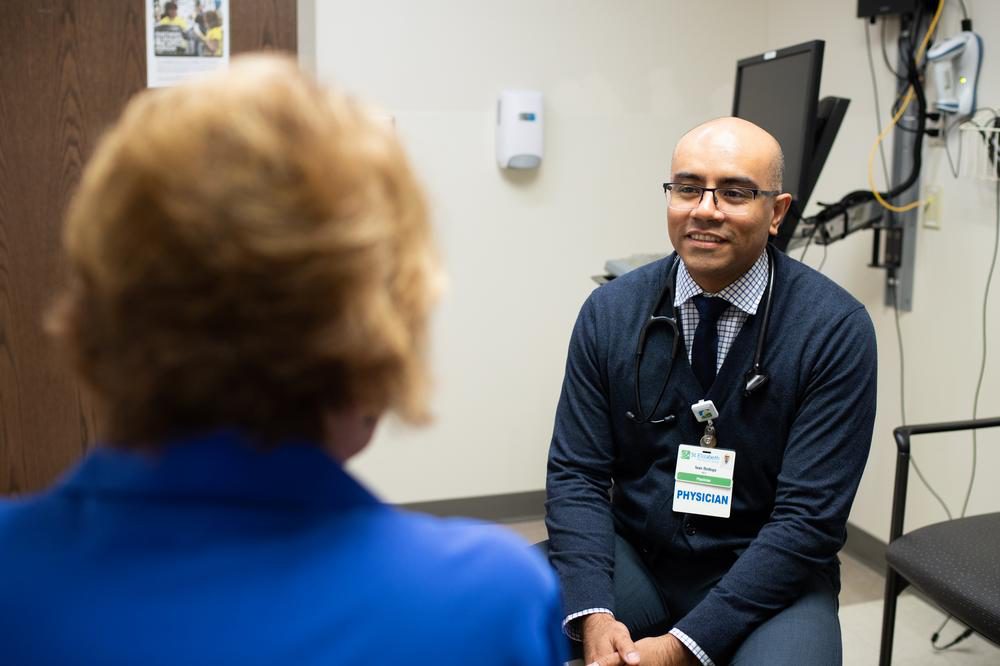Brain and Nervous System Cancer
St. Elizabeth Healthcare takes a team approach to diagnosing and treating brain and nervous system conditions. Our neurosurgeons, oncologists and radiation oncologists work together with our entire cancer care team to create personalized treatment plans to treat brain and nervous system cancers.
Treatment of your tumors will depend on its type and location. Surgery is often the first step. At St. Elizabeth, we specialize in minimally invasive surgical approaches to remove tumors, sparing as much healthy tissue as possible.
Brain Tumors
Brain tumors can be cancerous or noncancerous masses. They can begin in your brain or be from another cancer that has spread to your brain. Brain tumors from other types of cancer (metastatic brain tumors) are more common than primary brain tumors.
Brain tumors are unique in every patient. They vary in size and how quickly they grow. Types of brain tumors include:

Make an appointment
For more information, please contact your oncologist or the Cancer Care Center at (859) 301-4000
Symptoms of a brain tumor include:
- Changes in speech, hearing, or personality.
- Confusion.
- Dizziness.
- Feeling drowsy.
- Headache.
- Problems with balance or walking.
- Seizures.
- Vision problems.
- Vomiting.
- Weakness or numbness in the arms, legs, or face.
Causes of Brain Tumors
Brain tumors have a number of causes. They share some common risk factors, including:
Brain and Nervous System Cancer Screening
Routine screenings for brain cancer before symptoms begin do not yet exist. If you have a family history or other risk factors, it’s important to keep an eye out for symptoms of brain cancer. If you have a number of risk factors, your doctor may also recommend regular imaging tests. If an imaging study detects anything suspicious, doctors can then take a tissue sample (biopsy) to see whether it’s cancer.
Genetic Testing for Brain and Nervous System Cancer
We know that a cancer diagnosis comes with many questions — including whether a family member is at risk for getting cancer too or whether your cancer diagnosis is hereditary. The certified genetic counselors at St. Elizabeth Healthcare are here to help you uncover those answers.
If you have a family history of cancer or are concerned about your risk, genetic counseling is an option to consider. Genetic counseling provides important information to you and your family about cancer risk and risk reduction and prevention.
For patients diagnosed with brain or nervous system cancer, our hereditary cancer program can provide important information to you and your family including information on inherited disease. Genetic testing can help determine how a cancer will respond to treatment. This information can help us plan a treatment approach specific to your type of cancer.
Brain and Nervous System Cancer Diagnosis
Brain and nervous system tumors can be benign (noncancerous) or malignant (cancerous). Because there currently aren’t widely recommended tests to screen for these cancers, diagnosis usually occurs if a person has signs or symptoms.
We offer state-of-the-art diagnostic imaging for brain and nervous system cancers and other non-cancerous conditions, including:
Brain and Nervous System Cancer Treatment
Treating brain and nervous system cancers requires an individualized approach that takes a wide range of factors into account, including the type and stage of your cancer and whether it’s spread into other areas of your body.
Treatment options may include:
Brain and Nervous System Cancer Surveillance
When you’re diagnosed with or treated for brain or nervous system cancer, you have the entire team at St. Elizabeth Cancer Center to help. Your care does not end when active treatment is finished. We want to make sure your cancer doesn’t come back — and if it does, we want to make sure we catch it early.
Once your treatment is over, our cancer care team will create a schedule of follow-up visits so we can monitor your progress carefully. Because brain tumors are likely to recur, it’s important to keep in touch with your St. Elizabeth team so we can start treatment quickly.
Our team will be by your side from the minute you are diagnosed through your survivorship program.


